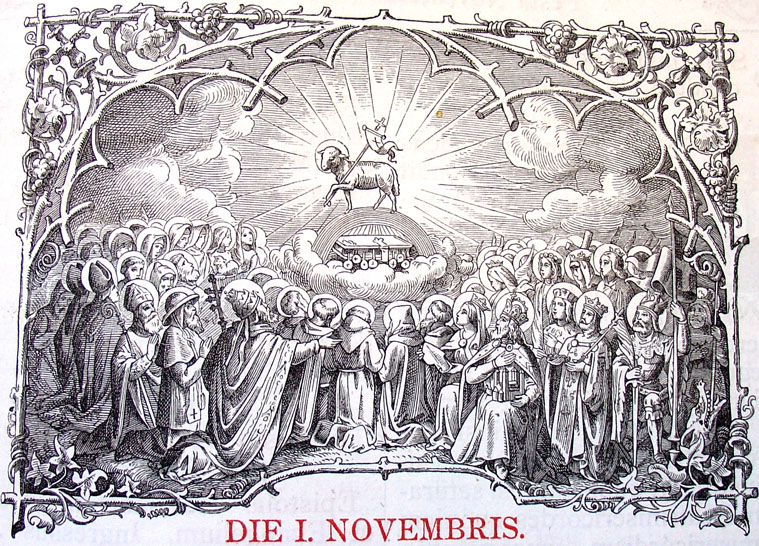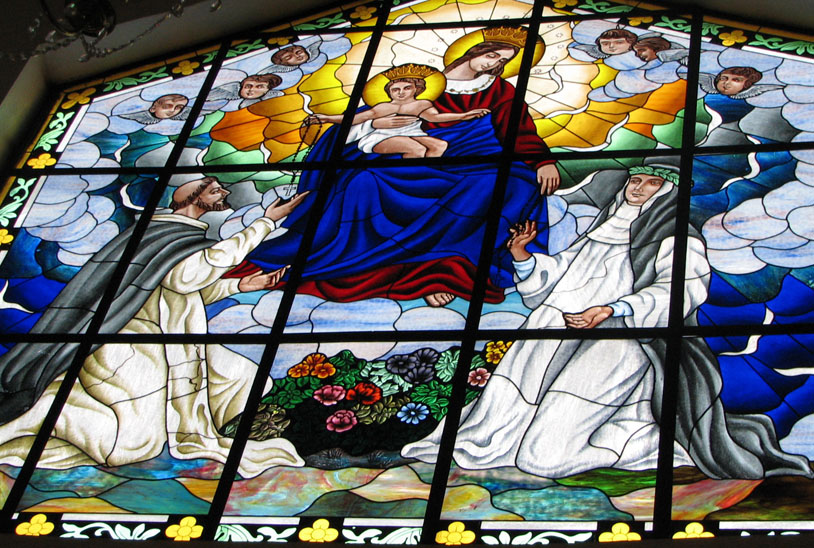
I'm not usually drawn to modern architecture, especially that of the 1960s, but over the past few weeks (indeed, I have now been here for exactly 3 weeks), I have found myself increasingly appreciative of the modern building of Blackfriars Cambridge which connects the two villas which form the original premises of the priory. In particular, I have become rather fond of the chapel (
above) which is on the second floor of the building and which forms the main feature of this structure. The exterior of this building, with the glass windows of the chapel clearly visible is depicted on a
previous post in this blog.
Cambridge does not suffer from a lack of beautiful and note-worthy architecture. In fact, I have spent a few afternoons wandering about the town and marvelling at the Tudor and Gothic edifices of the various colleges, and engaging in gargoyle-spotting. I found this particular beast (
below) and many others like it surmounting the chapel of the famed
King's College where its renowned choir sings almost daily.

Blackfriars is neither Gothic nor Tudor in style, however it shares the exposed brickwork of the latter and the creamy-golden colour of the former's stonework. Like the College chapels that are so prominent in many of Cambridge's older institutions, the chapel of Blackfriars is punctuated by windows, but rather than being panes of stained glass, these are floor-to-ceiling sheets of clear glass, which alternate with sections of creamy brickwork. The friars in their habits seem to blend into the background against this hue of local brick!
Etched into the glass (
below) are medieval-inspired icons of the archangels, whose feast we celebrated only this week. Chief among them is St Michael in whose honour this priory is dedicated, indicative of the triumph of Truth and Good over Evil. As these angelic designs are merely etched into the glass, they are unobtrusive and their presence is only hinted at by the play of light upon them. In this sense, they are truly like the angels they represent, who are ever present in our lives yet who are barely seen and whose presence is felt and glimpsed in the most unexpected of moments. There is a clear beauty in such theologically-minded symbolism and art that, in my opinion, (and in this rare circumstance) can surpass even stained glass!
This symbolism continues in the very position of the chapel, whose windows look onto a mature and tranquil garden on one side and a busy street on the other. In the morning, as the autumn sun rises, one sees (and hears in the distance) the buses, cars and ubiquitous bicycles traversing the street to and from the centre of Cambridge. But on the opposite side of the chapel, one sees only the dappled shade from the trees cast onto a well-cultivated lawn. The boughs of the trees sway gently in the morning breeze, one hears the wind rustle the leaves and beholds them gradually gilded as the autumn days progress. These two sides of the chapel clearly symbolize the twin dimensions of the Dominican life - contemplation and the apostolic life; the quiet and calm of the interior garden, the "
cell of self-knowledge" of the soul (as St Catherine of Siena memorably phrased it) and the world of the preaching mission and apostolate which takes the Gospel into the streets and thoroughfares of life.

In the evenings, when the chapel is in use, and were one to approach it from without, it glows with a golden light from within, like a lantern or as an icon of the "city of the hill-top" which shines out and bears witness to Christ, the true Light. Indeed, the priory is built on one of Cambridge's rare few 'hills', hence its dedication to the Prince of the Heavenly Host, whose shrines are customarily built on hill-tops. Moreover, passers-by can clearly see the friars, sisters and lay faithful within the illuminated chapel, who are engaged in the Liturgy. One even hears the strains of Gregorian chant if you walked close enough. As such, we bear witness to the worship of the one God to all the world that comes our way.
These glass sheets, our windows, which let so much of the outside world into the visual spaces of the chapel and which form a living, ever-changing backdrop to the Liturgy, and which - at the same time - make visible the Liturgy and prayer of the community to all and sundry is indicative of the openness which characterises Dominican spirituality. It also speaks of the interaction between the friar and the world which always informs and stimulates our theological reflection and preaching. As the Dutch lay Dominican, Erik Borgman, writes in his book '
Dominican Spirituality: An Exploration', "Dominican life needs to be like an open book which tells of an ordering that gives life a divine quality..." and "
true spirituality consists especially in openness, attentiveness and the capacity to be touched." I think this chapel indicates this openness.
Truly, I feel this chapel embodies that and many of the qualities of the Dominican life, and this is fitting. For it is a place I shall spend many hours in prayer and reflection (and working, as assistant sacristan!) How wonderful that its very walls speak so eloquently to me and that its architecture has been so conducive to prayer and contemplation.
I would love to mention more too on the art found within the chapel, especially the replica of the 'Thornton Parva' retable which is seen above and adorns the east wall of our chapel. It is a beautiful example of medieval Dominican art of the East Anglian region. Fr Aidan Nichols OP has already written well and at length on this artifact and I refer you to
his article on the Blackfriars' website. Suffice to say that it too is a rich image for meditating upon.

Beautiful too is the simple iron crucifix (
right) that hangs above the altar. Most evenings, before Compline, I like to just gaze upon this image of our Lord crucified and linger on the finely-wrought hands and feet of Him who were pierced for our sake. And as we sing and pray "
Into your hands, O Lord, I commend my spirit", echoing the words of Christ on the Cross, I am able to unite myself with Him through this iron crucifix with the open arms; the arms of Christ who are open in readiness to embrace me and all sinners... Looking at the subtly-crafted hands of this crucifix, I place myself into the hands of the Lord every night, trusting in Him and knowing that it is only by His grace that I have been brought here to Blackfriars Cambridge and that with Him alone will I continue steadfast on my Novitiate journey this year and persevere and grow in my Dominican vocation.
Let us pray for this grace of perseverance, and place ourselves into the Lord's hands. May Our Lady of the Rosary, Patroness of the Order of Preachers, whose feast we celebrate this week, guide and protect us and may St Therese of Lisieux, whose memoria is marked today intercede for us!























